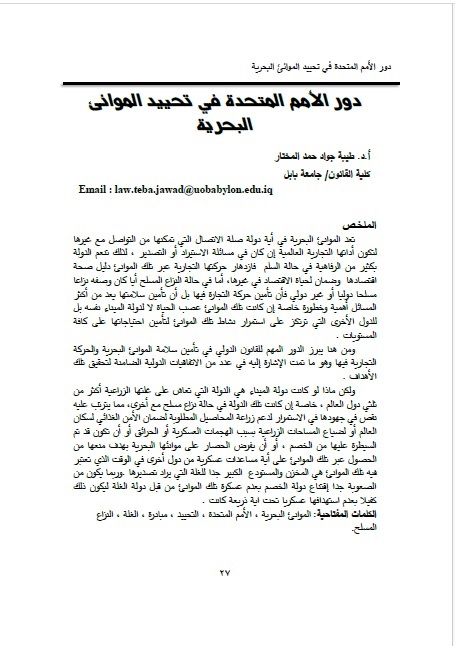The Role of the United Nations in Neutralizing Seaports
Main Article Content
Abstract
The seaports in any country are the link that enables it to communicate with others to be its global commercial tool, whether in the matter of import or export, so the country enjoys a lot of luxury in the state of peace, and the prosperity of its commercial movement through those ports is evidence of the health of its economy and a guarantee for the life of the economy in others. In the case of armed conflict, whatever its description as an international or non-international armed conflict, securing the movement of trade in it, rather securing its safety is one of the most important and dangerous issues, especially if those ports are the backbone of life, not for the port state itself, but for other countries that depend on the continuation of the activity of those ports. To secure its needs at all levels.
Hence the important role of international law in securing the safety of seaports and commercial traffic in them, which has been referred to in a number of international agreements guaranteeing the achievement of these goals.
But what if the port state is the country that more than two-thirds of the world's countries live on from its agricultural yield, especially if that country is in a state of armed conflict with another, which results in a lack of its efforts to continue to support the cultivation of crops required to ensure food security for the world's population or loss Agricultural areas due to military attacks or fires, or to have been controlled by the enemy, or to impose a blockade on its seaports with the aim of preventing it from obtaining through those ports any military aid from other countries at a time when those ports are considered the very large storehouse and warehouse For the crops that are to be exported. It may be very difficult to convince the adversary country not to militarize those ports by the yielding country, so that this would ensure that they are not targeted militarily under any pretext.
Article Details

This work is licensed under a Creative Commons Attribution-ShareAlike 4.0 International License.
References
أولا : المصادر العربية
أ. الكتب
ـ د. صلاح عبد البديع شلبي، الوجيز الميسر في القانون الدولي، دار النهضة العربية، القاهرة، 2010 .
ـ د. عصام العطية ، القانون الدولي العام ، الطبعة الثانية ، بعة مزيدة ومنقحة ، المكتبة القانونية، بغداد 2012.
ب. الاتفاقيات الدولية
ـ اتفاقية جنيف الخاصة بالموانئ البحرية والمعقودة عام 1923.
ـ ميثاق الأمم المتحدة صدر بمدينة سان فرانسيسكو في يوم 26 حزيران/يونيه 1945 .
ـ اتفاقيات جنيف الأربع لعام 1949 والبروتوكولين الإضافيين لعام 1977 الملحقين بها .
ـ اتفاقية قانون البحار عام 1982 .
ت. الوثائق الدولية
ـ الأمم المتحدة " صادرات الحبوب من البحر الأسود صفقة" منارة الأمل "وسط حرب أوكرانيا - غوتيريش" 22 تموز / يوليو 2022.
ـ الأمم المتحدة ، اتفاقية تحرير صادرات الحبوب من الموانئ الأوكرانية الموقعة في 25 تموز / يوليو 2022 .
ث. القوانين الوطنية
ـ القانون العراقي رقم 21 لسنة 1995 .
ـ القانون اليمني رقم 23 لسنة 2013 الخاص بشؤون الموانئ البحرية .
ثانيا : المصادر الأجنبية
- . ArchiAved, . "Los 10 mayores puertos de América Latina y Caribe en tráfico de contenedores". , Revista de Ingeniería Naval.Spain: Asociación de Ingenieros Navales y Oceánicos de España 28 Sep 2016 from the original on 2017-10-18. Retrieved 2017-05-03.
- I. Roa, Y. Peña, B. Amante, and M. Goretti, "Ports: Definition and study of types, sizes and business models", J. Industr. Engin. Management., vol. 6, no. 4, 2013. [http://dx.doi.org/10.3926/jiem.770]
-.Marco Casagrande ,Seaports in International Law, Springer International Publishing : Imprint: Springer, 2017, VI 114 p. online resource Springer, Briefs in law. 2192-8568,
berkeley.edu
- P. Bauchet, "Le transport maritime, Paris", Economica, , 1992.
-T. Paul, Les enjeux de développement pour les ports de commerce bretons., Université de Bretagne-sud, 2007.
